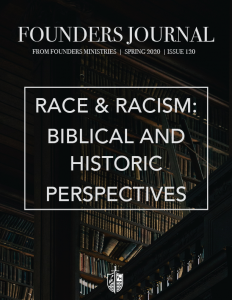In This Founders Journal Edition
We begin with a poetic presentation of the History of Redemption by Reagan Marsh entitled “Every.” As a true poet, Reagan does not give a title to each division. But, as a more prosaic person looking for explanations, I have described the purpose of each division. To honor the poet, I have not included these in the form as it appears here, but for those who want to take hints (it might be more edifying and even fun to figure it out for yourself) I give my surmise of the content here. The divisions begin with Creation and Decrees. The second division concerns the place of Adam as covenant head of humanity in his innocence, his test of positive obedience, and his fall. The third division emphasizes the results of the fall on humanity. The fourth division depicts Jesus as the covenant head of his elect. The fifth division gives a dramatic picture of the resurrection. The sixth division outlines the graces received through the death, resurrection, ascension, and session of Jesus the Christ. Division seven gives a dramatic picture of final judgment. The eighth division gives snapshots of Christ and one another in heaven.
An article by Toby Jennings (Athanasius redivivus at large) deals with the ever-important and also immediately relevant topic of “Race and Racism in the Bible.” Toby’s description of the article says, “The essay first addresses notions of race and then biblical ideas about justice.” He shows that the Bible regards humanity as “a single race of created beings descendent from a singular progenitor . . . beautifully diversified, as designed, into a multitudinous tapestry of mishpachowt—families (Rev 5:9; 7:9).” He gives a brief but helpful narrative of some of the moorings of racism in modern times and shows that racism is both irrational and immoral. Jennings gives a profound exposition of God’s law as the unwavering standard of justice and the foundation by which judgment will come to all individuals. He shows how concepts of justice, even in the context of needed mercy, assume the unchanging nature of the law. He looks at the biblical doctrine of the cross and justification as the most unwavering manifestation of justice and questions as to whether a case can be built for the idea of “social justice.”
“Reformed by the Word: One Church’s Journey” by Scott Lee, pastor of Rockport Baptist Church in Arnold MO, gives an honest narrative of the difficulties involved in bringing Bible-based reformation to a church. He gives from his heart, his diary, his knowledge of Scripture, and his love for truth a poignant story of how reformation came and how it continues to move forward in Arnold, MO.
An article on John A. Broadus, “The Good is Oft Interred with Their Bones,” offers an opinion by Tom Nettles on the legitimacy of the proposal to retire the “Broadus gavel.”
This issue of the Founders Journal closes with reviews of two books on the verge of publication. They should be of special interest to our readers. One book is authored by Jim Renihan, President of IRBS Theological Seminary, on the First London Confession. The second is a new biography of George Whitefield by Kurt Smith, pastor of Providence Reformed Baptist Church in Remlap, AL on Pine Mountain.





























